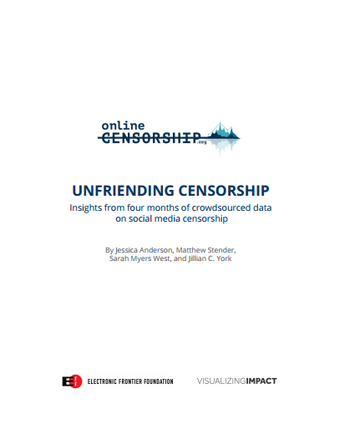
Unfriending Censorship
Sites like Facebook, Twitter, and YouTube play an increasingly prominent role as platforms for digital speech, the companies that run them are serving as gatekeepers, determining what constitutes “acceptable” content for public consumption. As self-ordained content moderators, they face increasingly thorny issues; deciding what constitutes hate speech, harassment, and terrorism is challenging, particularly across many different cultures, languages, and social circumstances. Some users treat popular social media platforms as the proverbial "public sphere," a space collectively owned and open to activism and debate.
Facebook’s “real names” policy and nudity policy on social media are analyzed in specific sections. The manner in which social media companies implement their regulations can seriously impact the lives of users. While content takedowns might be brushed aside as the companies’ prerogative, several of the companies the authors have studied are no longer simply taking down content, but imposing temporary and longer-term bans on users who violate the rules. These bans are often surprising to users who may not realize the consequences of violating the rules or that they’ve violated the rules at all.
Currently, there is a lack of transparency surrounding content moderation decisions, as well as the processes through which users can appeal to restore their content when it is removed. In order to encourage companies to operate with greater transparency and accountability toward their users, the authors have collected reports from users.
Tags: Censorship Social mediaThe content of this article can be used according to the terms of Creative Commons: Attribution-NonCommercial 4.0 International (CC BY-NC 4.0) . To do so use the the wording "this article was originally published on the Resource Centre on Media Freedom in Europe" including a direct active link to the original article page.

